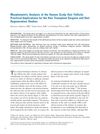71 citations,
December 1987 in “Journal of animal science/Journal of animal science ... and ASAS reference compendium” Hair analysis is not a precise way to measure livestock's mineral status but can help when used with other methods.
 8 citations,
October 2016 in “Experimental dermatology”
8 citations,
October 2016 in “Experimental dermatology” Hair follicles may help teach the immune system to tolerate new self-antigens, but this can sometimes cause hair loss.
 50 citations,
January 2016 in “The FEBS journal”
50 citations,
January 2016 in “The FEBS journal” RANK is a key target in breast cancer treatment due to its role in tumor growth and bone metastasis.
 27 citations,
April 2017 in “British Journal of Dermatology”
27 citations,
April 2017 in “British Journal of Dermatology” Hair loss involves immune responses, inflammation, and disrupted signaling pathways.
 421 citations,
April 2012 in “The New England Journal of Medicine”
421 citations,
April 2012 in “The New England Journal of Medicine” Alopecia Areata is an autoimmune condition causing hair loss with no cure and treatments that often don't work well.
 29 citations,
February 2013 in “Proceedings of the National Academy of Sciences of the United States of America”
29 citations,
February 2013 in “Proceedings of the National Academy of Sciences of the United States of America” Loss of Fz6 disrupts hair follicle and associated structures' orientation.
January 2014 in “대한미용학회지” Sandalwood oil promotes hair growth and delays hair loss in mice.
 April 2020 in “Research Square (Research Square)”
April 2020 in “Research Square (Research Square)” Melatonin treatment improved cashmere production in goats for one cycle without lasting effects on the next cycle.
 9 citations,
July 2020 in “Journal of Animal Physiology and Animal Nutrition”
9 citations,
July 2020 in “Journal of Animal Physiology and Animal Nutrition” Melatonin given to pregnant rabbits improved their babies' fur quality.
 8 citations,
August 2020 in “Domestic Animal Endocrinology”
8 citations,
August 2020 in “Domestic Animal Endocrinology” Melatonin improved cashmere production in goats during the first cycle but had no lasting effects on the next cycle.
31 citations,
September 1996 in “Differentiation” The upper dermal sheath can regenerate hair in rats.
 21 citations,
October 2009 in “Biochemical Engineering Journal”
21 citations,
October 2009 in “Biochemical Engineering Journal” Stem cell therapy is a promising approach for hair regrowth despite potential side effects.
 32 citations,
May 2018 in “Cell Cycle”
32 citations,
May 2018 in “Cell Cycle” Melatonin helps Cashmere goats grow more hair by affecting certain genes and cell pathways.
 1 citations,
July 2005 in “Drugs and the pharmaceutical sciences”
1 citations,
July 2005 in “Drugs and the pharmaceutical sciences” Targeting drugs to hair follicles can treat skin conditions, but reaching deep follicle areas is hard and needs more research.
4 citations,
January 2018 in “Microscopy research” Scientists found markers called CD34 and CD200 that help identify stem cells in mouse and human hair follicles.
 129 citations,
May 2015 in “Cell Stem Cell”
129 citations,
May 2015 in “Cell Stem Cell” Different types of stem cells exist within individual skin layers, and they can adapt to damage, transplantation, or tumor growth. These cells are regulated by their environment and genetic factors. Tumor growth is driven by expanding, genetically altered cells, not long-lived mutant stem cells. There's evidence of cancer stem cells in skin tumors. Other cells, bacteria, and genetic factors help maintain balance and contribute to disease progression. A method for growing mini organs from single cells has been developed.
 November 2018 in “Springer eBooks”
November 2018 in “Springer eBooks” Finasteride and minoxidil are effective, low-risk treatments for male hair loss, and patient education on these therapies is important.
 1 citations,
January 2016 in “Elsevier eBooks”
1 citations,
January 2016 in “Elsevier eBooks” The document concludes that identifying the specific cells where skin cancers begin is important for creating better prevention, detection, and treatment methods.

Erythropoietin overexpression disrupts hair growth and fat formation in mice.
 51 citations,
January 2004 in “Skin Pharmacology and Physiology”
51 citations,
January 2004 in “Skin Pharmacology and Physiology” The document explains hair growth and shedding, factors affecting it, and methods to evaluate hair loss, emphasizing the importance of skin biopsy for diagnosis.
 April 2018 in “The journal of investigative dermatology/Journal of investigative dermatology”
April 2018 in “The journal of investigative dermatology/Journal of investigative dermatology” miR-486 may help prevent hair loss in alopecia areata.
 2 citations,
January 2014 in “Hair therapy & transplantation”
2 citations,
January 2014 in “Hair therapy & transplantation” New treatments for hair growth disorders are needed due to limited current options and complex hair follicle biology.
 January 1996 in “Springer eBooks”
January 1996 in “Springer eBooks” Hair can regrow if the sebaceous gland is intact, even if the hair root is removed.
 January 2014 in “Journal of the Korean Society of Design Culture”
January 2014 in “Journal of the Korean Society of Design Culture” The study confirmed that changes in hair structure in women with hair loss conditions matched what is taught in beauty college trichology courses.
 May 2024 in “Food bioscience”
May 2024 in “Food bioscience” Wood sterol may help reduce hair loss caused by a high-fat diet.
 10 citations,
May 2020 in “Dermatology Research and Practice”
10 citations,
May 2020 in “Dermatology Research and Practice” Proteoglycans are important for hair growth, and a specific treatment can help reduce hair loss.
 September 2019 in “The journal of investigative dermatology/Journal of investigative dermatology”
September 2019 in “The journal of investigative dermatology/Journal of investigative dermatology” Tet1/2/3 enzymes affect hair follicle cell development by influencing BMP signaling.
43 citations,
January 2016 in “Development” LHX2 is essential for hair follicle development, controlled by NF-κB and TGFβ2 signaling.
 April 2017 in “Journal of Investigative Dermatology”
April 2017 in “Journal of Investigative Dermatology” Higher leptin levels link to hair loss.
 51 citations,
November 2010 in “Dermatologic Surgery”
51 citations,
November 2010 in “Dermatologic Surgery” The research provides specific measurements for hair follicles that can improve hair transplant and regeneration techniques.
























